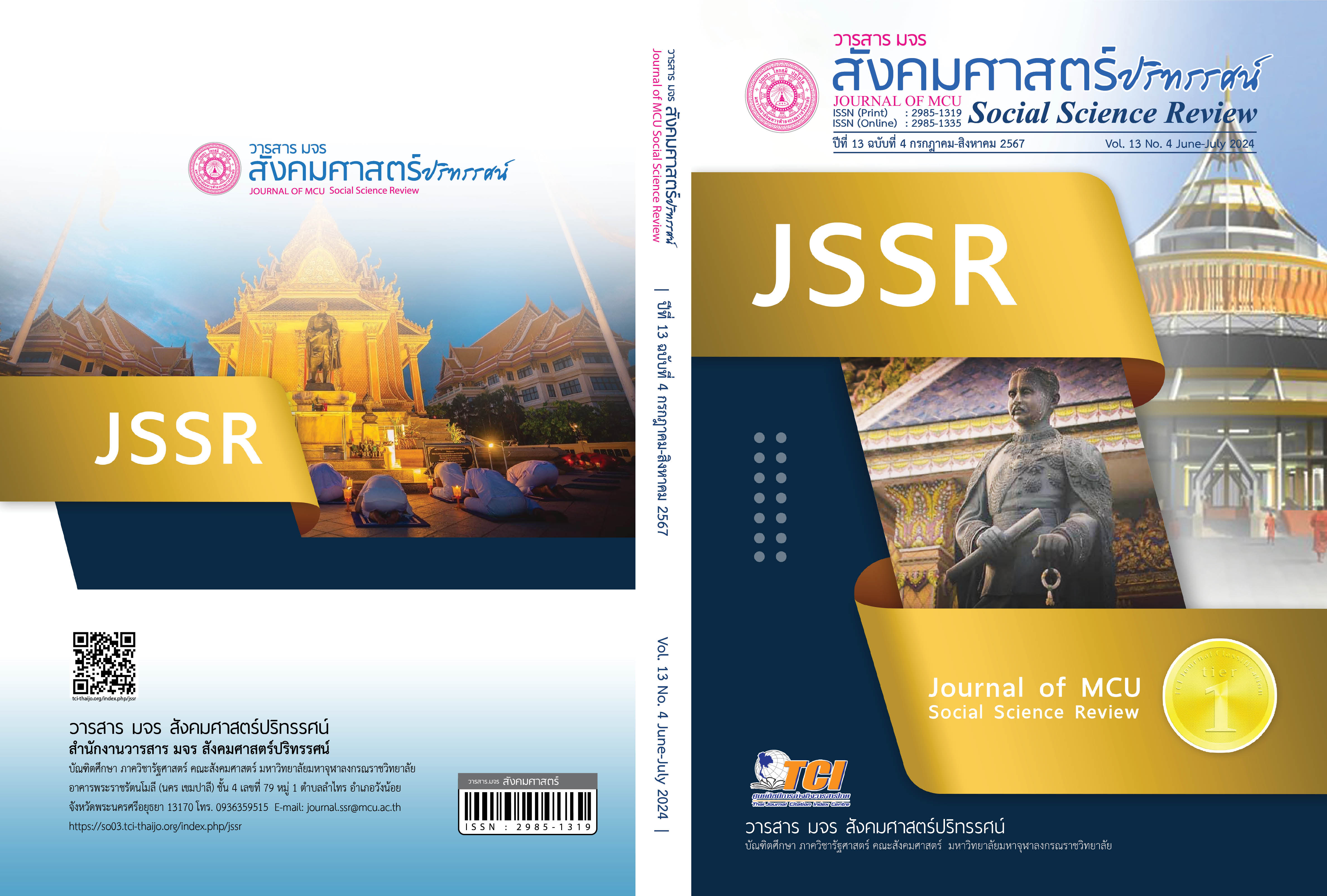การพัฒนาหลักสูตรฝึกอบรมเพื่อพัฒนาสมรรถนะที่จำเป็นของบุคลากรมูลนิธิ ช่วยคนตาบอดแห่งประเทศไทย ในพระบรมราชินูปถัมภ์
คำสำคัญ:
การพัฒนาหลักสูตรฝึกอบรม, สมรรถนะ, บุคลากรบทคัดย่อ
บทความวิจัยนี้มีวัตถุประสงค์ 1. ศึกษาสมรรถนะที่จำเป็นของบุคลากรมูลนิธิ 2. สร้างหลักสูตรฝึกอบรม 3. ประเมินหลักสูตรฝึกอบรม เป็นการวิจัยผสมผสาน วิจัยกลุ่มบุคคลากรมูลนิธิฯ โดยสุ่มแบบเจาะจง คือ ผู้ให้ข้อมูล จำนวน 16 ท่าน และกลุ่มตัวอย่างในการทดลองจำนวน 30 คน เครื่องมือที่ใช้ ได้แก่ แบบสัมภาษณ์ หลักสูตร และแบบประเมินสมรรถนะเก็บข้อมูลโดยการสัมภาษณ์ ส่งแบบประเมิน และการทดลองใช้หลักสูตร วิเคราะห์ข้อมูลโดยการวิเคราะห์เนื้อหา ค่าเฉลี่ย ส่วนเบี่ยงเบนมาตรฐาน ทดสอบค่าที
ผลการวิจัยพบว่า 1. สมรรถนะที่จำเป็นของบุคลากรมูลนิธิช่วยคนตาบอดแห่งประเทศไทย ในพระบรมราชินูปถัมภ์ พบว่าสมรรถนะที่จำเป็น มี 4 ด้าน ได้แก่ การพัฒนาตนเอง ความรู้เกี่ยวกับผู้พิการทางการเห็น การบริการที่ดี และการทำงานเป็นทีม 2. การสร้างหลักสูตรฝึกอบรม โครงร่างมีความเหมาะสมอยู่ในระดับมาก และมีความสอดคล้องกัน 3. การประเมินหลักสูตรฝึกอบรมด้วยการทดลองใช้ พบว่า ค่าเฉลี่ยการประเมินสมรรถนะที่จำเป็นของผู้เข้าอบรมหลังการฝึกอบรมสูงกว่าก่อนการฝึกอบรมอย่างมีนัยสำคัญทางสถิติที่ระดับ 0.05
เอกสารอ้างอิง
คณาจารย์ภาควิชาพื้นฐานการศึกษา. (2562). การศึกษาพิเศษสำหรับครู. กรุงเทพฯ: สำนักพิมพ์มหาวิทยาลัยรามคำแหง.
จิรประภา อัครบวร. (2561). 100 สูตร (ไม่) ลับพัฒนาคน. กรุงเทพฯ: กรกนกการพิมพ์.
ชัยวัฒน์ รังสิมันตุ์วงศ์ และทิพย์วิมล วังแก้วหิรัญ. (2559). การพัฒนาหลักสูตรสาระการเรียนรู้ท้องถิ่นเพื่อพัฒนาชุมชน. วารสารเศรษฐศาสตร์และกลยุทธ์การจัดการ, 3(2), 94-102.
พิมพ์พรรณ เทพสุเมธานนท์ และสุการต์พิชา ปิยะธรรมวรากุล. (2558). การศึกษาพิเศษ SPECIAL EDUCATION (พิมพ์ครั้งที่ 2). กรุงเทพฯ: โรงพิมพ์สำนักพิมพ์มหาวิทยาลัยรามคำแหง.
มารุต พัฒผล. (2561). การประเมินหลักสูตรเพื่อการเรียนรู้และพัฒนา (พิมพ์ครั้งที่ 4). กรุงเทพฯ: บริษัท จรัลสนิทวงศ์การพิมพ์ จำกัด.
มูลนิธิช่วยคนตาบอดแห่งประเทศไทย ในพระบรมราชินูปถัมภ์. (2564). เกี่ยวกับมูลนิธิช่วยคนตาบอดแห่งประเทศไทยในพระบรมราชินูปถัมภ์. สืบค้น 28 กุมภาพันธ์ 2564, จาก http://www.blind.or.th/about/about
รุ่งทิวา จันทน์วัฒนวงษ์. (2557). เอกสารประกอบการสอนรายวิชาการพัฒนาหลักสูตร: Curriculum Development. อุดรธานี: มหาวิทยาลัยราชภัฏอุดรธานี.
วงพักตร์ ภู่พันธ์ศรี. (2563). จิตวิทยาเด็กพิเศษ (พิมพ์ครั้งที่ 13). กรุงเทพฯ: สำนักพิมพ์มหาวิทยาลัยรามคำแหง.
วิรัตน์ สุทัศน์ และสาธร ทรัพย์รวงทวง. (2561). แนวทางการพัฒนาสมรรถนะของครูการศึกษาพิเศษ ในโรงเรียนเฉพาะความพิการกลุ่ม 5. ปทุมธานี: มหาวิทยาลัยรังสิต.
สำนักงานปลัดกระทรวงศึกษาธิการ. (2554). คู่มือในการปฏิบัติงานสำหรับครูผู้สอนคนพิการ. กรุงเทพฯ: สำนักงานกรมส่งเสริมการเรียนรู้.
อาภรณ์ ภู่วิทยพันธ์. (2555). Competency-based training road map (TRM) (พิมพ์ครั้งที่ 2). กรุงเทพฯ: เอช อาร์ เซ็นเตอร์.
Caffarella, R. S. (2002). Planning Programs for Adult Learners: A Practical Guide for Educators, Trainers, and Staff Developers (2nd ed.). Hoboken: PB Printing.
Knowles, M. S. et al. (2005). The Adult Learner: The Definitive Classic in Adult Education and Human Resource Development (6th ed.). London: Elsevier.
Li-Sauerwine, S. & King, A. (2018). Curriculum Development: Foundations and Modern Advances in Graduate Medical Education. London: IntechOpen.
ดาวน์โหลด
เผยแพร่แล้ว
รูปแบบการอ้างอิง
ฉบับ
ประเภทบทความ
สัญญาอนุญาต
ลิขสิทธิ์ (c) 2024 วารสาร มจร สังคมศาสตร์ปริทรรศน์

อนุญาตภายใต้เงื่อนไข Creative Commons Attribution-NonCommercial-NoDerivatives 4.0 International License.
เพื่อให้เป็นไปตามกฎหมายลิขสิทธิ์ ผู้นิพนธ์ทุกท่านต้องลงลายมือชื่อในแบบฟอร์มใบมอบลิขสิทธิ์บทความให้แก่วารสารฯ พร้อมกับบทความต้นฉบับที่ได้แก้ไขครั้งสุดท้าย นอกจากนี้ ผู้นิพนธ์ทุกท่านต้องยืนยันว่าบทความต้นฉบับที่ส่งมาตีพิมพ์นั้น ได้ส่งมาตีพิมพ์เฉพาะในวารสาร มจร สังคมศาสตร์ปริทรรศน์ เพียงแห่งเดียวเท่านั้น หากมีการใช้ภาพหรือตารางหรือเนื้อหาอื่นๆ ของผู้นิพนธ์อื่นที่ปรากฏในสิ่งตีพิมพ์อื่นมาแล้ว ผู้นิพนธ์ต้องขออนุญาตเจ้าของลิขสิทธิ์ก่อน พร้อมทั้งแสดงหนังสือที่ได้รับการยินยอมต่อบรรณาธิการ ก่อนที่บทความจะได้รับการตีพิมพ์ หากไม่เป็นไปตามข้อกำหนดเบื้องต้น ทางวารสารจะถอดบทความของท่านออกโดยไม่มีข้อยกเว้นใดๆ ทั้งสิ้น





